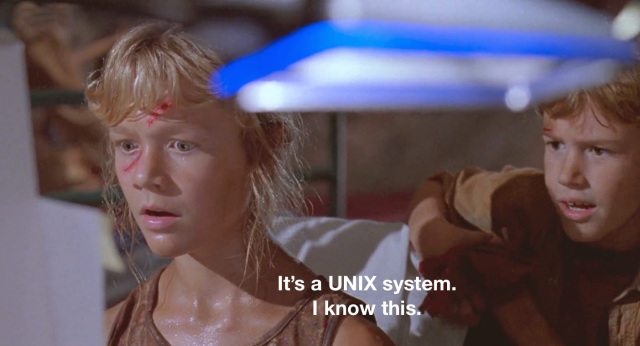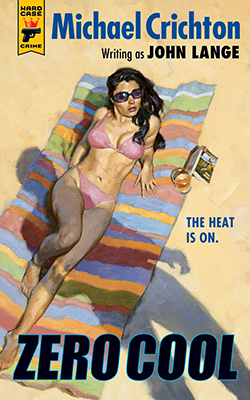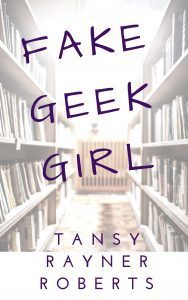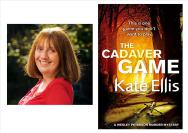January isn’t typically the time for beach reading, but struggling with a post-travel cold virus led me to take a break from a Frank Herbert book and find something less demanding. Hard Case Crime to the rescue! Now, which author to pick for some dependably shallow reading …

Before he wrote his very famous and lucrative techno-thrillers,* Michael Crichton (1942-2008) was a medical student who wrote pot-boilers under the name John Lange. The Lange books remained out of print for decades until their emergence under the Hard Case Crime label.

Gregory Manchess cover for Hard Case Crime. hardcasecrime.com
Zero Cool (1969) is the far-fetched tale of Peter Ross, a young radiologist who is beginning a vacation on the shores of Spain’s gold coast. He is supposed to attend a conference in Barcelona at some point, but that’s just to get his airfare paid for. As soon as he can manage, he gets to the beach and meets the flight attendant Angela (that’s her on the Manchess cover). There are a few awkward sentences exchanged between the two, but in accordance to the laws of pulp fiction, she agrees to meet him later.
Unfortunately, that’s where the book starts to go south (yes, on page 20). Peter and Angela’s conversation is interrupted by a raving Spanish man, who insists that Peter not perform an autopsy later in the day. Peter is a radiologist, not a pathologist, and on vacation, and drinking a beer at the time, so he’s not planning on performing an autopsy anyway. A few hours later, another Spanish man, this time accompanied by some suspicious-looking friends, attempt to plead and bribe Peter into performing an autopsy.
In both conversations with mysterious Spanish men, Peter is threatened with death if he performs/does not perform the autopsy. However, we already know that Peter survives his trip intact, because Michael Crichton added a prologue to ZC, featuring a still-alive Peter Ross! Why do this? To spare me the hair-raising suspense? To imply that Peter is an unreliable narrator, when he commits unethical medical procedures or, perhaps, abandons a love-child? My theory is that in his editing ZC for the HCC edition, Crichton felt the desire to disown it in his own peculiar way. If this was the case, it makes my running scorecard of author-renounced genre novels:
- Survivor, by Octavia Butler
- The Saliva Tree, by Brian Aldiss
- The Zap Gun, by Philip K. Dick
- The Jugger, by Donald Westlake
All of the above made interesting reading in my estimation, but they are all made more interesting when considering what their respective authors thought of them. Butler thought she made the aliens in Survivor too familiar, deriding it as her “Star Trek” novel.** Aldiss claimed to have completely forgotten writing The Saliva Tree, but I found it to be a good, sharp satire of H.G. Wells and his idealistic Socialism. The Zap Gun was a mess of some very interesting concepts and characters. The Jugger was an odd fit into the Parker series, mainly because some un-Parker asides were written into it at the editor’s insistence. Whether ZC and Crichton belong on this list is a more compelling mystery than the events of ZC itself.
As we would expect, Peter soon performs the autopsy, and is also coerced into sewing a heavy package inside the chest cavity of the body. The corpse thus becomes a macguffin to be chased by the competing parties who introduce themselves to Peter throughout the rest of the story. We learn that the package is likely a giant emerald that was once the property of the Aztec civilization, but the historical discussion seems dodgy.
Angela is the most interesting character in ZC, but that’s really by default. There is a large cast of gangsters, villains, other women, cops and even predatory animals, but there is no depth to any of them. I couldn’t bring myself to care who died, who ran away with the giant emerald or who was responsible for all of the dead bodies that keep turning up. The winding plot is a sequence of pulp gimmicks, pushing well beyond the threshold of eye-rolling absurdity:
He glanced at the elevator lights. The elevators were already to the eighth floor. The police were closing in.
He had no choice. He knocked on the door that was ajar and pushed it open.
“Excuse me,” he said as he entered the room and closed the door behind him, “But I’m afraid I –”
He stopped.
And stared, as anyone might, when faced with a beautiful girl, standing in the middle of her apartment at midday, wearing a very sheer nightgown, and beneath that, nothing at all.
“Lover!” she cried, and flung her arms around him.
It might be tempting to compare ZC to Westlake’s comedy God Save the Mark, in which a lifelong target of con artists (a regular schlub named Fred Fitch) suddenly finds himself with a large inheritance. He attracts new friends and interesting women almost by the minute. The difference with the Westlake novel is twofold: God Save the Mark is a farcical statement on the opportunism of ordinary people, and Fred Fitch is an interesting, sympathetic character. ZC is, ignoring the tacked-on prologue and epilogue, given to us as a straight adventure yarn, and Peter Ross is just never interesting. We’re told he has “zero cool,” but his reactions to everything are generally flat – maybe he has too much cool. “Zero cool” would describe my chihuahua.
Despite all of these shortcomings, ZC reads quickly and features plenty of action. I did get to the end without difficulty. 3/10.
NOTE: See this for a more focused and less critical take.
* Kudos to the great Laura Dern for somehow making a believable human being out of her Jurassic Park character. Run!
** Butler was, of course, a great author but always struck me as very self-critical. Of the books I’ve read, her central characters consistently and aggressively interrogate themselves.
Advertisements Share this:




